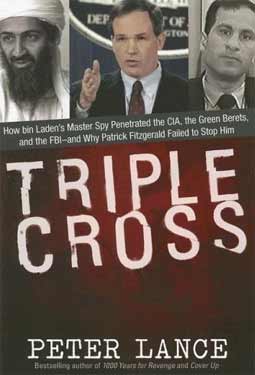U.S. Attorney Threatens S.B. Writer with Lawsuit
Peter Lance to Discuss Allegations at Book-Signing Today
One could argue that U.S. attorney Patrick Fitzgerald – a top Department of Justice prosecutor responsible for the big-headline conviction of Scooter Libby and indictment of Illinois Governor Rod Blagojevich – would be the last person in the country to be vilified in a 600-plus page book. However, area author and five-time Emmy award-winning investigative reporter Peter Lance has not only succeeded in riling a proven prosecutor, he may have actually gotten away with it.

It’s been a month since Fitzgerald threatened to sue HarperCollins, a News Corporation subsidiary, over the release of Lance’s latest work, Triple Cross – a recent revision of his 2006 book which criticizes Fitzgerald’s handling of terror cases in the 1990s. Since October 2006, Fitzgerald has exchanged several letters with HarperCollins in which he denigrates Lance’s account, calling for the publisher to stop distribution of the book and cancel all future printings.
In his latest letter to HarperCollins, dated June 2, 2009, Fitzgerald referred to Lance’s book as a “deliberate lie masquerading as truth” and slammed the publisher’s standards. “To put it plain and simple,” Fitzgerald wrote in the letter, “if in fact you publish the book this month and it defames me or casts me in false light, HarperCollins will be sued.” Despite the claim, four weeks have passed since the release of the new paperback version of the book and HarperCollins has yet to be served with a lawsuit. “It is unprecedented for a U.S. official to do something like this,” Lance said, in reference to Fitzgerald. “He has been living in a bubble, working for four presidents. You can’t just bully a publishing company and an author.”
Lance’s Triple Cross hinges on the controversy surrounding Ali Mohamed, one of Osama bin Laden’s Al Qaeda master spies. In his investigative report which covers seven years, Lance details how Mohamed successfully infiltrated the deepest levels of the U.S. intelligence community leading up to the 9/11 attacks and highlights how the FBI’s best – including Fitzgerald – failed to stop him. According to Lance, top FBI officials knew that Mohamed had sworn allegiance to bin Laden as early as 1993. After meeting Mohamed in 1997, whom Fitzgerald described as “the most dangerous man I have ever met,” the FBI left Mohamed free, a 10-month period when he helped Al Qaeda execute the East African embassy bombing plot conducted in Nairobi, Kenya.

The newest edition of the book – which was released June 16 – consists of 604 pages of text accompanied by 1,420 endnotes and an introduction responding to Fitzgerald’s string of threatening letters. Alberto Rojas, HarperCollins spokesperson, confirmed that Fitzgerald has been in correspondence with the publishing company with regard to the release of Triple Cross. “Yes, Fitzgerald did try to contact us. The letters have been posted online,” Rojas said in an email. Fitzgerald has not responded to requests by The Independent to comment on the matter as of press time.
In a response letter dated November 2, 2007, Mark Jackson of HarperCollins did admit to a small factual error in Lance’s book found in the first full paragraph of page 367. The section, which stated that an NBC News report regarding intelligence of Al Qaeda activity in East Africa was first broadcast in December 2000, contradicted information on the MSNBC Web site containing the report with the date of October 24, 2003. Jackson, speaking on behalf of the entire publishing company, reiterated that HarperCollins “stand[s] behind Mr. Lance and intend{s} to go forward with the publication of the updated trade paperback edition of the book, which we regard as an important work of investigative journalism.”
In order for Fitzgerald to mount a successful claim for libel, he would have to prove that the statement was not only false, but written with malice, as defined by the Supreme Court in the landmark case New York Times v. Sullivan as “reckless disregard for the truth”, according to Lance. “They have to have a much higher burden of proof in a libel case,” Lance said. “Patrick Fitzgerald knew he did not have a viable libel claim.”
What Fitzgerald may have overlooked is that his continued effort to block the distribution of Lance’s book has propelled Triple Cross into the public eye.
4•1•1
C-Span’s Book TV program will be taping a discussion given by Lance on the Fitzgerald situation at the downtown Barnes & Noble (829 State St.) on Saturday, July 18, from 2 to 4 p.m.



